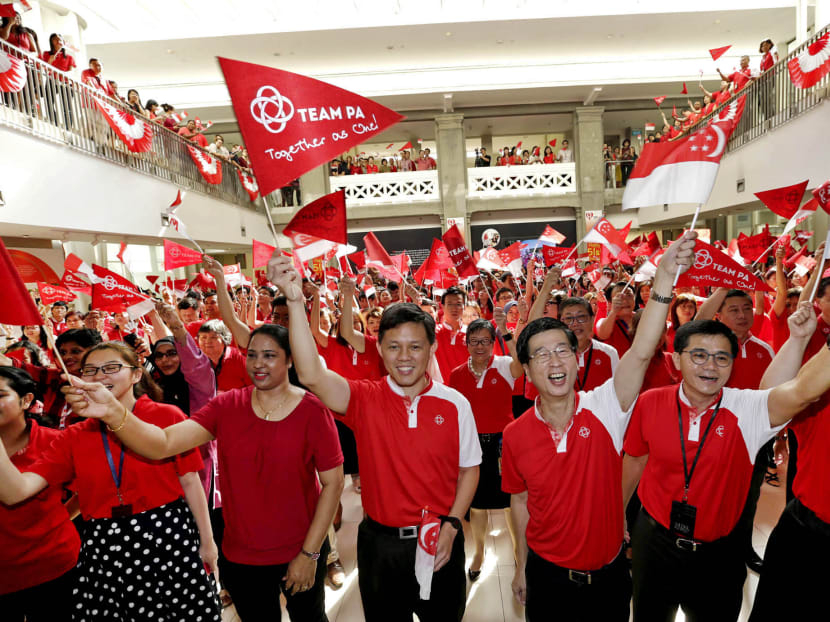Govt agencies don’t do political outreach, but their work could have ‘political impact’: Chan Chun Sing
SINGAPORE — Weighing in on the perennial debate over whether government agencies such as the People’s Association (PA) are politicised, Minister in Prime Minister’s Office Chan Chun Sing said in Parliament on Thursday (Mar 8) that the Government draws a distinction between “political outreach and impact”.

Speaking on the perennial debate over whether government agencies such as the People’s Association are politicised, Minister in Prime Minister’s Office Chan Chun Sing said in response to questions by Workers’ Party Members of Parliament that the Government draws a distinction between “political outreach and impact”. TODAY file photo
SINGAPORE — Weighing in on the perennial debate over whether government agencies such as the People’s Association (PA) are politicised, Minister in Prime Minister’s Office Chan Chun Sing said in Parliament on Thursday (Mar 8) that the Government draws a distinction between “political outreach and impact”.
During the debate on the budget of the Ministry of Culture, Community and Youth, Workers’ Party (WP) chief Low Thia Khiang had asked if PA activities which are led by grassroots advisers or prospective People’s Action Party (PAP) candidates, might be considered as political outreach.
In response, Mr Chan, who is PA’s deputy chairman, reiterated that in executing their duties, all government statutory boards are serving to “fulfill the functions of the elected government of the day”.
He stressed that as a statutory board, the PA’s mission is to promote social cohesion and racial harmony, as well as to connect people with the government. Through its community bonding programmes, PA also explains and gathers feedback on government policies to ensure a “responsive and responsible government”.
For instance, grassroots advisors, who are appointed by the government, have a role in “explaining difficult and sometimes unpopular policies that are necessary to the future” of Singapore, such as the impending goods and services tax hike and foreign manpower policies.
“(When) the government appoints people to help it outreach, sense the ground, respond to the ground… These are all part and parcel of government function,” he said.
Mr Chan cited the example of Sport Singapore’s outreach activities. Outlining the difference between political outreach and impact, he said: “Is SportSG being political? No, it’s not… Then you ask, when the statutory boards and government agencies do their work properly, and do their work well, does it have a political impact? The answer is obvious.”
But in this regard, the government of the day “has to be very careful that whenever it spends its money (or) does its outreach”, it does not “overstep its bounds to the political realm”. “We keep these two functions very separate,” he said.
WP Aljunied GRC MP Muhamad Faisal Manap also asked whether there would be a “conflict of interest” or “element of politicising” in a situation where a grassroots advisor, who is also a political party branch chairman, invites residents to go for his unofficial Meet-the-People session at the branch office. Letters written on behalf of residents in such instances bear the name of the political party on the letterhead, he noted.
Mr Chan said that many MPs wear “multiple hats” and straddle multiple capacities. However, they need to separate their responsibilities clearly, he added.
If residents do not want to see their MP in an Opposition ward as their first resort, they are at “liberty” to choose to visit the PAP branch and get the letter signed by the PAP branch chairman, even though it is not their elected MP, said Mr Chan. “When agencies receive the letter, they will know who is the MP that represents (the resident)… And they will give the matter due consideration,” said Mr Chan.
Aljunied GRC MP Pritam Singh, who is also the WP’s assistant secretary-general, also questioned the role of Community Development Centres (CDCs) — which are managed by PA — and the nature of the relationship between opposition town councils and the CDCs.
Citing the example of banners put up to convey festive greetings to residents, Mr Singh asked if an opposition town council can tap on some kind of co-funding for such activities. He noted that in PAP wards, the banners sometimes contain the logos of both the town council and the CDC. Would the CDCs similarly be willing to work with the WP-run Aljunied-Hougang Town Council, he asked.
Mr Chan reiterated that government agencies “do not fund political outreach for any political party”, but work together with community partners to serve the community. Noting that government agencies have worked with opposition town councils in the past, he said Mr Singh should approach the respective CDCs.
Mr Chan reiterated that the job of the elected government of the day is to run the country and do its best for the citizens. “That is why we select people to help the government of the day to make sure we can connect the people with the government, so that we will become a more responsive society and government… There’s no contradiction in that,” he said.






